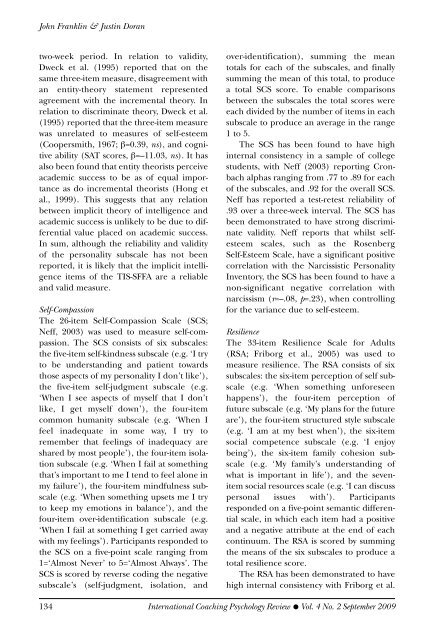International Coaching Psychology Review, 4.2, September 2009
International Coaching Psychology Review, 4.2, September 2009
International Coaching Psychology Review, 4.2, September 2009
You also want an ePaper? Increase the reach of your titles
YUMPU automatically turns print PDFs into web optimized ePapers that Google loves.
John Franklin & Justin Doran<br />
two-week period. In relation to validity,<br />
Dweck et al. (1995) reported that on the<br />
same three-item measure, disagreement with<br />
an entity-theory statement represented<br />
agreement with the incremental theory. In<br />
relation to discriminate theory, Dweck et al.<br />
(1995) reported that the three-item measure<br />
was unrelated to measures of self-esteem<br />
(Coopersmith, 1967; β=0.39, ns), and cognitive<br />
ability (SAT scores, β=–11.03, ns). It has<br />
also been found that entity theorists perceive<br />
academic success to be as of equal importance<br />
as do incremental theorists (Hong et<br />
al., 1999). This suggests that any relation<br />
between implicit theory of intelligence and<br />
academic success is unlikely to be due to differential<br />
value placed on academic success.<br />
In sum, although the reliability and validity<br />
of the personality subscale has not been<br />
reported, it is likely that the implicit intelligence<br />
items of the TIS-SFFA are a reliable<br />
and valid measure.<br />
Self-Compassion<br />
The 26-item Self-Compassion Scale (SCS;<br />
Neff, 2003) was used to measure self-compassion.<br />
The SCS consists of six subscales:<br />
the five-item self-kindness subscale (e.g. ‘I try<br />
to be understanding and patient towards<br />
those aspects of my personality I don’t like’),<br />
the five-item self-judgment subscale (e.g.<br />
‘When I see aspects of myself that I don’t<br />
like, I get myself down’), the four-item<br />
common humanity subscale (e.g. ‘When I<br />
feel inadequate in some way, I try to<br />
remember that feelings of inadequacy are<br />
shared by most people’), the four-item isolation<br />
subscale (e.g. ‘When I fail at something<br />
that’s important to me I tend to feel alone in<br />
my failure’), the four-item mindfulness subscale<br />
(e.g. ‘When something upsets me I try<br />
to keep my emotions in balance’), and the<br />
four-item over-identification subscale (e.g.<br />
‘When I fail at something I get carried away<br />
with my feelings’). Participants responded to<br />
the SCS on a five-point scale ranging from<br />
1=‘Almost Never’ to 5=‘Almost Always’. The<br />
SCS is scored by reverse coding the negative<br />
subscale’s (self-judgment, isolation, and<br />
over-identification), summing the mean<br />
totals for each of the subscales, and finally<br />
summing the mean of this total, to produce<br />
a total SCS score. To enable comparisons<br />
between the subscales the total scores were<br />
each divided by the number of items in each<br />
subscale to produce an average in the range<br />
1 to 5.<br />
The SCS has been found to have high<br />
internal consistency in a sample of college<br />
students, with Neff (2003) reporting Cronbach<br />
alphas ranging from .77 to .89 for each<br />
of the subscales, and .92 for the overall SCS.<br />
Neff has reported a test-retest reliability of<br />
.93 over a three-week interval. The SCS has<br />
been demonstrated to have strong discriminate<br />
validity. Neff reports that whilst selfesteem<br />
scales, such as the Rosenberg<br />
Self-Esteem Scale, have a significant positive<br />
correlation with the Narcissistic Personality<br />
Inventory, the SCS has been found to have a<br />
non-significant negative correlation with<br />
narcissism (r=–.08, p=.23), when controlling<br />
for the variance due to self-esteem.<br />
Resilience<br />
The 33-item Resilience Scale for Adults<br />
(RSA; Friborg et al., 2005) was used to<br />
measure resilience. The RSA consists of six<br />
subscales: the six-item perception of self subscale<br />
(e.g. ‘When something unforeseen<br />
happens’), the four-item perception of<br />
future subscale (e.g. ‘My plans for the future<br />
are’), the four-item structured style subscale<br />
(e.g. ‘I am at my best when’), the six-item<br />
social competence subscale (e.g. ‘I enjoy<br />
being’), the six-item family cohesion subscale<br />
(e.g. ‘My family’s understanding of<br />
what is important in life’), and the sevenitem<br />
social resources scale (e.g. ‘I can discuss<br />
personal issues with’). Participants<br />
responded on a five-point semantic differential<br />
scale, in which each item had a positive<br />
and a negative attribute at the end of each<br />
continuum. The RSA is scored by summing<br />
the means of the six subscales to produce a<br />
total resilience score.<br />
The RSA has been demonstrated to have<br />
high internal consistency with Friborg et al.<br />
134 <strong>International</strong> <strong>Coaching</strong> <strong>Psychology</strong> <strong>Review</strong> ● Vol. 4 No. 2 <strong>September</strong> <strong>2009</strong>

















